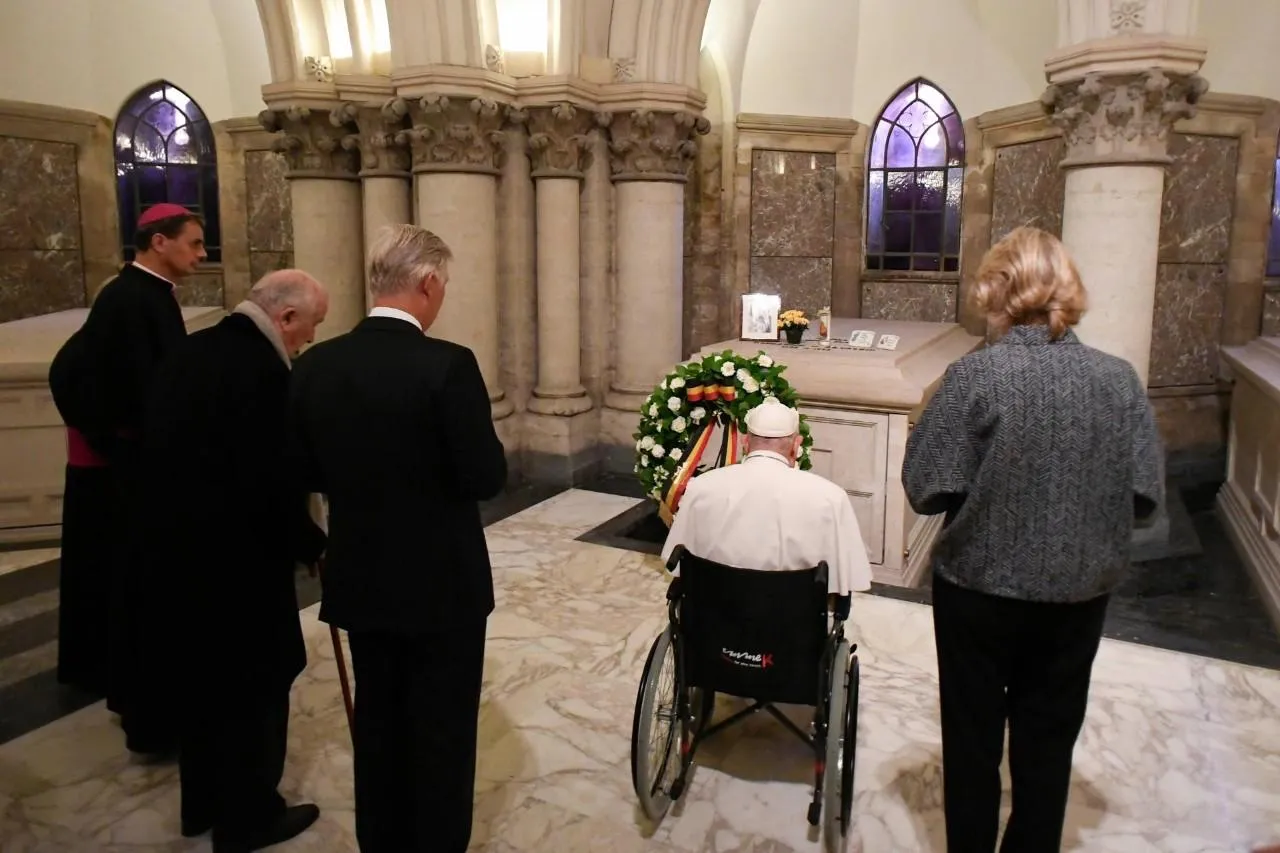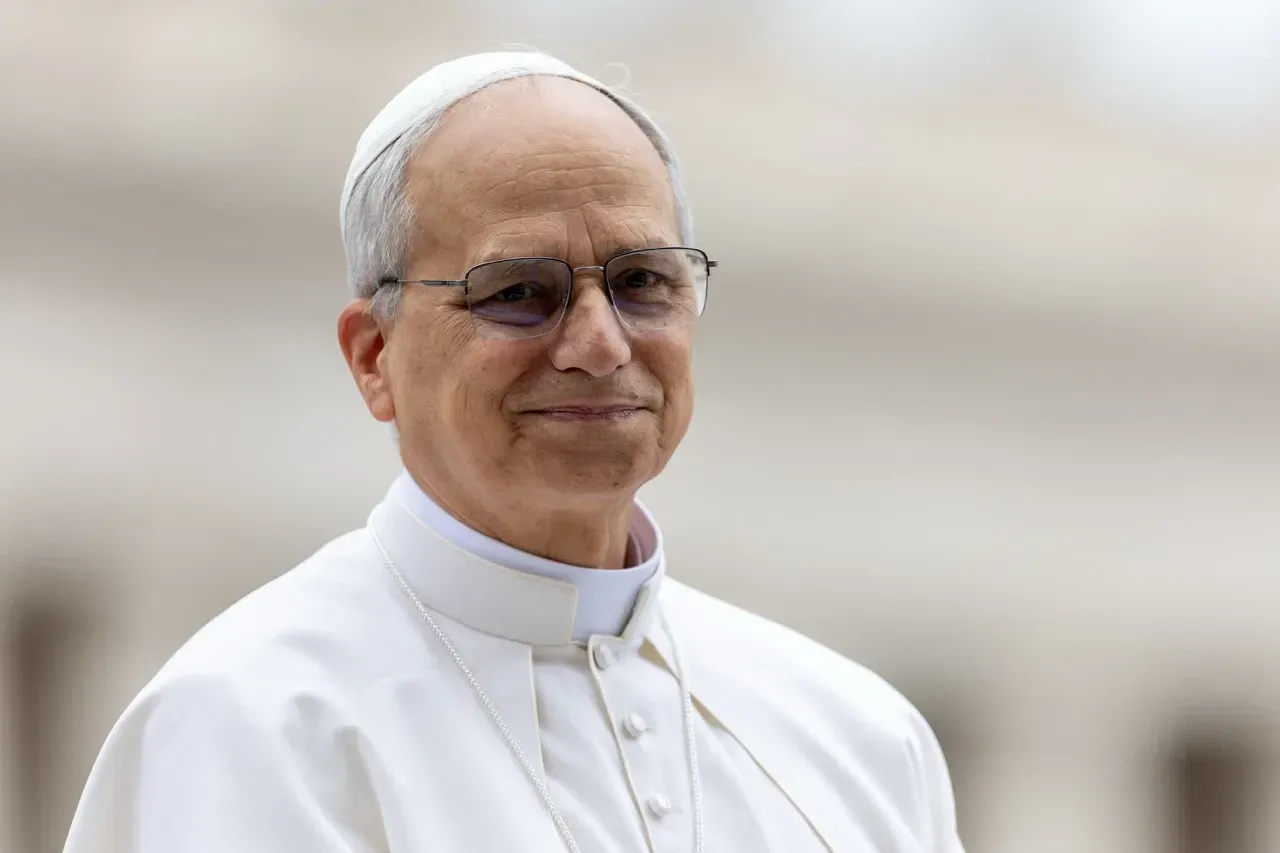Pope Francis has signaled his intentions to open a canonization cause for King Baudouin of Belgium, a controversial 20th-century figure known as a unifying force in his home country but for destabilization and colonialism elsewhere, especially in Africa.
The Holy Father shared his plans publicly over the weekend after completing a three-day trip to the Western European nation, which boasts of a majority Catholic population—including the royal family, which has reigned since 1831.
In a social media post on Sunday afternoon, the pope spoke of Baudouin as a particularly devout sovereign, having praised him on Saturday during a visit to his grave at the Church of Our Lady of Laeken in Brussels.
“Upon my return to Rome, I will start the beatification process of King Baudouin,” Francis wrote. “May his example as a man of faith illuminate all leaders.”
Upon my return to Rome, I will start the beatification process of King Baudouin. May his example as a man of faith illuminate all leaders.
— Pope Francis (@Pontifex) September 29, 2024
Born in 1930, Baudouin ascended to the Belgian throne as an adolescent, following a post-World War II crisis involving his father, King Leopold III, in 1950. Leopold had caused controversy during his reign due to his suspected collaborations with the Nazi regime in Germany, which invaded Belgium under his watch.
It was one of just several internal controversies to face the royal family in the 20th century, especially given its reputation as a nefarious foreign actor in Africa, where it presided over three colonies between 1908 and 1962 as part of the Belgian colonial empire.
Most infamously, Baudouin’s great-granduncle, King Leopold II, had fashioned the Congo Free State as his personal possession following an invasion in 1885, setting off what has since been termed the Rubber Terror, or the Congolese genocide.
75 years later, Baudouin reigned as the final sovereign of the Belgian Congo, formed in 1908 after international pressure forced Leopold II to transfer authority over the territory to the state. Though Baudouin granted independence to the Congo in 1960, he nevertheless praised his ancestor as “not a conqueror, but a civilizer.”
“The independence of the Congo is the culmination of a work conceived by the genius of King Leopold II, undertaken by him with tenacious courage and continued with perseverance by Belgium,” he said during a speech announcing the colony’s impending freedom.
Baudouin thereafter became entwined with Prime Minister Patrice Lumumba of the Democratic Republic of the Congo (DRC), a Black Catholic whose speech in retort at the same event excoriated the Belgian regime for its “injustice, oppression and exploitation,” as well as “persecution of free thought.”
Baudouin was reportedly incensed by Lumumba’s address and later supported secessionist forces against him in the DRC during the Congo Crisis. The king was also aware of an assassination plot against Lumumba before it was executed by soldiers under Belgian command in January 1961.
Due to these and other concerns, many Catholics have expressed concerns that such a figure should not be pursued for canonization, no less by the Vatican directly via the pope.
“King Baudouin assassinated Patrice Lumumba,” wrote Congolese journalist Gregoire Tshibingu on social media Monday morning.
“Opening a process with a view to his beatification denotes a habitual culture which has nothing to do with either the Faith or the Gospel.”
Roi Baudouin a assassiné Patrice LUMUMBA en RDCONGO, ouvrir un procès en vue de sa béatification dénote d'une culture habituelle qui n'a rien à avoir ni avec la Foi ni avec l'Evangile. pic.twitter.com/fIhpyRT1Fa
— greg kabadi (@greg_kabadi) September 30, 2024
The motivations behind the pope’s sudden push for a royal saint in Belgium are uncertain, though supporters of Baudouin—including the Holy Father—have praised his decision to temporarily abdicate to avoid signing an abortion bill into law in 1990. (Neither the Holy See press director nor the Dicastery for the Causes of Saints responded to a request for comment from Black Catholic Messenger.)
The king was known to have been a devout Catholic, participating in the Catholic Charismatic Renewal under the influence of Cardinal Leo Suenens of Mechelen-Brussels and serving as a patron of various religious causes. Upon his death in 1993, Baudouin received a grand funeral Mass at which Suenens’ successor, Cardinal Gottfried Daneels, praised him as a model of King David.
“For him the conscience was absolute. It was the voice of the deepest part of the human person and the voice of God,” the prelate said of Baudouin.
“He always followed it, even at the risk of his personal interests, even at the risk of putting the monarchy into question. He knew that human life was worth such a price.”
Should Pope Francis proceed to open a cause of canonization for Baudouin, it would be one of few worldwide not to originate in the home diocese of the deceased in question. It is unclear, however, the exact mechanisms intended by the Holy Father to initiate the process.
It is also not the first time the pope has connected himself to a controversial royal sainthood cause in recent years. In 2020, Francis intervened to reopen the sainthood cause of Queen Isabella I of Castile, a monarch known for expelling the Jews from Spain, initiating the Spanish Inquisition, and kickstarting the Spanish Empire in the New World.
Nate Tinner-Williams is co-founder and editor of Black Catholic Messenger.










